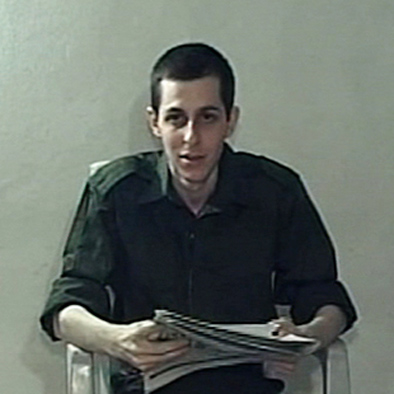Israel has apparently given a green light, albeit with conditions attached, to exchange hundreds of jailed Palestinian militants for an Israeli soldier held captive by Hamas in the Gaza Strip, DPA reported.
Hamas is demanding the release of around 1,000 jailed militants in exchange for Gilad Shalit, who was snatched on June 25, 2006 during a cross-border raid by three militias based in the coastal salient.
The Israeli response, with conditions attached, to the Hamas demands was given to the German mediator negotiating the deal, following a marathon series of discussions among seven top Israeli ministers.
A senior Hamas official, speaking on condition of anonymity, said his organization had received the Israeli reply, and the Hamas leadership would hold a meeting later Tuesday to study it.
Israel Radio, quoting "senior officials," Tuesday morning, said the Israeli conditions include a list of prisoners Israel will not let return to their homes in the West Bank, but wants to send to the Gaza Strip or exile overseas.
"So far, Hamas still rejects the principle of deporting a large number of prisoners out the Palestinian territories, and still wants to reduce the number of prisoners that Israel wants to deport to Gaza or abroad," Hamas leader Ayman Taha told the German Press Agency dpa.
A late-night meeting of seven Israeli ministers held Monday - their fifth session since Sunday - ended without any formal announcement, despite speculation to the contrary beforehand.
All Israeli officials would say immediately after the meeting broke up after midnight, was that the government's negotiating team has been instructed to continue its efforts to secure Shalit's release.
The exact parameters of the proposed deal have been kept tightly under wraps and few details have been leaked from the meetings the seven ministers have held.
Reports which have emerged from the discussions say Prime Minister Benjamin Netanyahu is opposed to allowing freed Hamas activists to return to their homes in the West Bank, for fear they would launch attacks on nearby Israeli population centres, or would attack the Palestinian Authority, which controls the West Bank and is Hamas' bitter rival.
The premier is believed to be holding out for the activists to be sent to the Gaza Strip, or even exiled overseas.
Defence Minister Ehud Barak, one of the so-called "forum of seven", said Tuesday that Israel had a duty to return Shalit, but not at all cost.
"We who sent Gilad have an ethical responsibility to make every feasible effort to bring Gilad home. Not at any price, but every possible and feasible effort," he told high school students.
According to reports while the seven ministers were meeting, the forum was split down the middle, with three ministers opposed to Hamas' demands and three in favour, leaving Netanyahu with the casting vote.
Those who oppose the deal say that based on past experience, the released activists will again take up arms against Israel. They also fear that accepting the Hamas demands will lead to more Israelis being captured in the future in order to serve as bargaining chips for the release of more of the estimated 10,000 Palestinian prisoners in Israeli jails.
Those in favour of the deal say Israel is unlikely to be get a better offer from Hamas for Shalit's return. They also point out that Shalit was snatched while serving the state and the state thus has an obligation to see him freed.
According to Israeli media reports Tuesday, if Hamas accepts this demand, the full Israeli cabinet would be convened in order to approve the deal.






